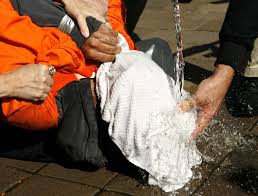Neither slavery nor involuntary servitude, except as a punishment for crime whereof the party shall have been duly convicted, shall exist within the United States, or any place subject to their jurisdiction.
Section 2.
Congress shall have power to enforce this article by appropriate legislature.
Breakdown...
The 8th Amendment:
Excessive bail shall not be required, nor excessive fines imposed, nor cruel and unusual punishments inflicted.
Compromises between the need for the accused to show up for trial, and allows him/her a family business guaranteed to not be excessive.
- Bail is not a right.
- Judge can deny bail for capital and violent crimes if the accused poses serious risks of flight.
- Amendment 8 gives the right to protect from cruel and unusual punishment.
Unusual: punishment a court has never imposed before.
Cases...
Whitley V. Albers 1986
Addresses unnecessary and wanton infliction of pain.
Albers was a prisoner whose claims arise from his having been shot in the knee by defendant prison officials while they were quelling a prison disturbance in "A" Block of the Oregon State Penitentiary on June 27, 1980. Cellblock "A" consists of two tiers and houses more than 200 inmates. The only reasonable mode of access between the two tiers is a connected stairway. The stairway is separated from the lower tier by a barred door. Prison officers may enter the cellblock from either end, on either tier and can control entry into either tier by means of barred walkways. Defendant Whitley was security manager of the penitentiary; defendant Cupp was superintendent; defendant Keeney was an assistant superintendent; and defendant Kennecott was a corrections officer.
Weems V. U. S. 1910
1. Punishment may not be greatly disproportioned to offences charged.
2. Cruel and Unusual punishment does not have to involve physical pain to qualify as cruel.
Weems was 'a duly appointed, qualified, and acting disbursing officer of the Bureau of Coast Guard and Transportation of the United States Government of the Philippine Islands,' who had been convicted of falsifying official records of the United States Coastguard which resulted in the government being defrauded of the total of 612 pesos.
The Philippine Criminal Code mandated 15 years in prison with hard labor for this offense, plus the added punishment of cadena temporal which required him to be constantly in chains. In addition, he lost all political rights during imprisonment, was subject to permanent surveillance after his release, and was fined 4,000 pesetas.
Weems appealed his conviction on the grounds that it constituted cruel and unusual punishment.
Robinson V. California 1962
Court said a 90 day prison sentence given to a man for the use of narcotics violated the 8th Amendment.
This case incorporated cruel and unusual punishment clause to states.
In a 6-to-2 decision, the Court held that laws imprisoning persons afflicted with the "illness" of narcotic addiction inflicted cruel and unusual punishment in violation of the Eighth and Fourteenth Amendments. The Court likened the law to one making it a criminal offense "to be mentally ill, or a leper, or to be afflicted with a venereal disease," and argued that the state could not punish persons merely because of their "status" of addiction. The Court noted that the law was not aimed at the purchase, sale, or possession of illegal drugs.
Cooper Industries Inc. V. Leatherman Tool Group, Inc. 2001
The Court reversed a Ninth Circuit decision applying a less stringent abuse-of-discretion standard to a trial court's decision upholding a punitive damages award.
Leatherman Tool Group, Inc., manufactures a multi function pocket tool, the Pocket Survival Tool (PST). In 1996, Cooper Industries, Inc. used photographs of a modified PST to introduce a competing tool, the ToolZall. The photographs were used in posters, packaging, and advertising materials. Subsequently, Leatherman filed an action asserting claims of trade-dress infringement, unfair competition, and false advertising under the Trademark Act of 1946 (Lanham Act). Ultimately, a trial jury awarded Leatherman $50,000 in compensatory damages and $4.5 million in punitive damages. The District Court then entered judgment, rejecting Cooper's argument that the punitive damages were grossly excessive. In affirming, the Court of Appeals, using an "abuse of discretion" standard, concluded that the District Court did not abuse its discretion in declining to reduce the award.
Gregg vs Georgia 1976
Capital punishment does not violate the 8th Amendment for cruel and unusual punishment.
1. Makes sure Jury is impartial.
2. The Jury has been allowed to hear all circumstances.
3. The Jury is not forced to hand down the sentence.
A jury imposed the death sentence on Gregg (Defendant), after finding him guilty on charges of armed robbery and murder.

Gregg vs Georgia 1976
Capital punishment does not violate the 8th Amendment for cruel and unusual punishment.
1. Makes sure Jury is impartial.
2. The Jury has been allowed to hear all circumstances.
3. The Jury is not forced to hand down the sentence.
A jury imposed the death sentence on Gregg (Defendant), after finding him guilty on charges of armed robbery and murder.
This is a comical image depicting the confusion as to what constitutes cruel and unusual torture.
This image depicts a prisoner receiving torture by placing a bag over her/his head and pouring water on the top. The prisoner will feel as if he/she is drowning. This method of torture is not seen as cruel or unusual, it is easy to point fingers at other countries for torture methods, but by this approved method of torture in our counry we are defining ourselves as hypocrites.

No comments:
Post a Comment